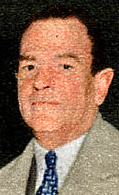The Pittsburgh Press (February 19, 1944)
C. E. Bedaux, Windsor pal, ends his life
‘Speedup’ expert held by U.S. on suspicion of treason

Bedaux
Miami, Florida (UP) –
Charles E. Bedaux, millionaire industrialist and financier who was arrested by Gen. Dwight D. Eisenhower on suspicion of treason and communicating with the enemy, died in Jackson Hospital last night of an overdose of poison self-administered several days ago.
Bedaux, 56, longtime friend of the Duke of Windsor, had been held by immigration authorities here who were determining the validity of his citizenship acquired in 1917.
Indictment sought
His death occurred as two special assistant attorneys general, Edward J. Ennis and John J. Burling, were preparing to seek a federal grand jury indictment for treason growing out of Bedaux’s activities in Vichy France and North Africa prior to the U.S. invasion of the latter.
Bedaux, inventor of the famous “speedup” system of production in modern industrial plants, had been in custody of immigration officials since last Dec. 23, when he was returned from military arrest in Algiers.
In Washington, Edward J. Ennis, chief of the Justice Department’s Enemy Control Unit, provided a clue to the reason behind Bedaux’s suicide. He said Bedaux was informed the day before his suicide attempt that his American citizenship was valid. That meant he could be tried for treason in American courts instead of being deported to North Africa as a Frenchman and turned over to French authorities for whatever action they might take. This might involve a trial as a traitor.
Found by attorney
Bedaux’s death was announced here by immigration officials and in Washington by Attorney General Francis Biddle.
On Tuesday morning, Mr. Biddle said, Bedaux’s attorney found him unconscious in his quarters at the Immigration Service and he was taken to the hospital where he remained in coma until his death. Pneumonia and other complications contributed to his death.
Mr. Biddle said Bedaux, in a note to his secretary, explained he had accumulated a sleeping compound over a period of time from small doses allotted him by medical authorities at the detention station.
Born in France Oct. 10, 1886, Bedaux entered this country during World War I, established himself as a consulting engineer and was naturalized at Grand Rapids, Michigan, in 1917.
He became known as an efficiency expert and established companies bearing his name in this country and throughout Europe and the rest of the world, exercising overall management from Amsterdam, Holland.
In 1927, Bedaux purchased a chateau near Tours, France, and his visits to the United States became steadily infrequent.
Friend of Nazis
The special board of inquiry investigating his citizenship in Miami found that Bedaux admitted close friendships among many of the highest-ranking officers of the Nazi Party and of the Vichy French government.
It was said that he was visiting Foreign Minister Joachim von Ribbentrop in Salzburg in August 1939, when the German diplomat was ordered to Moscow to conclude the Berlin-Moscow Non-Aggression Pact.
Bedaux opened his chateau to the U.S. Embassy staff at the fall of France in 1940, it was said, and subsequently appeared to carry on negotiations intimately with the Germans and the Vichy French.
Invited to Berlin
Sent to North Africa in July 1941, at the request of Vichy, Bedaux developed a plan whereby oil refineries on the Persian Gulf could be protected by the Germans against bombing. He was invited to Berlin to discuss this plan less than a month before the United States entered the war, Mr. Biddle disclosed.
In the summer of 1942, Bedaux undertook to construct a pipeline across the Sahara Desert which he said would bring edible oils from French West Africa to shipping points on the Mediterranean in order to relieve the critical shortage of such oils in Europe.
Bedaux claimed that the pipeline could be employed in reverse, it was said, to supply water for the construction of the Trans-Sahara Railway connecting Dakar with the North.
Named French aide
Bedaux was appointed an economic consultant to the German military administration in France and gained authority from Chief of State Pierre Laval for the pipeline. He also obtained permission for the manufacture of 60,000 tons of steel pipe and pumping equipment and 25,000 liters of gasoline in connection with the project.
Reaching Algiers in October 1942, Bedaux set up headquarters in the Aletti Hotel and began to assemble an expedition of men and equipment scheduled to move Nov. 15. British and U.S. forces invaded North Africa Nov. 8. It was shortly afterward that he was arrested.
FBI men killed
When military authorities determined that Bedaux should not be tried by a military court, Mr. Biddle dispatched Assistant Director Percy E. Foxworth and FBI Special Agent Harold O. Haberfeld to North Africa to investigate. They were killed when their plane crashed somewhere over the Brazilian jungles in January 1943, but other agents were immediately sent to carry out the assignment.
Bedaux is survived by his widow Fern, a native of the United States said to be living in France, and a son, Charles Jr., believed to be in North Africa.
Trip canceled
Bedaux had been a friend of the Duke of Windsor for many years. The Duke and Mrs. Wallis Warfield Simpson were married in Bedaux’s chateau near Tours in June 1937.
Several months later, when the Duke and Duchess decided to go to the United States to study industry and housing, Bedaux appeared as sponsor of the trip. His sponsorship caused a loud protest from labor and the trip was subsequently canceled.